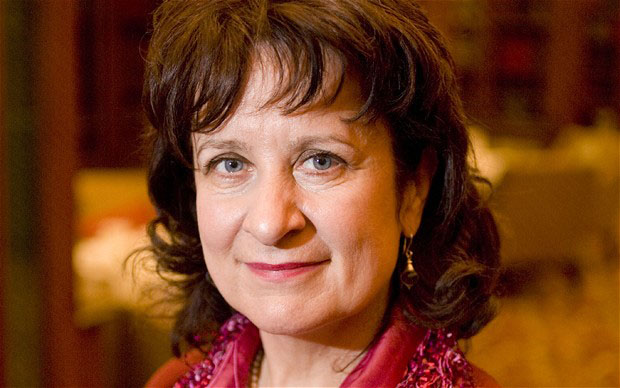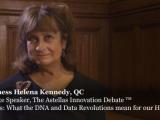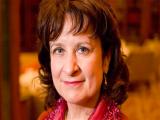Baroness Helena Kennedy, QC, joins panel at
The Astellas Innovation Debate™ 2015
i-Genes: What the DNA and Data Revolutions mean for our Health
Chaired by Jonathan Dimbleby
Keynote Speaker: George Freeman, MP, Minister for Life Sciences
Royal Institution of Great Britain, Thursday 29th January 2015, 6:30pm
To be webcast live: www.innovationdebate.com
View an interview with Baroness Kennedy ahead of the Debate https://youtu.be/10LHF6UlQVI
Chertsey, England; 19 January, 2015 - Barrister, peer and Vice-President of the Patients Association Baroness Helena Kennedy has joined a panel of internationally recognised experts for the 3rd Astellas Innovation Debate: i-Genes – What the DNA and Data Revolutions mean for our Health, taking place on Thursday 29th January 2015 at the Royal Institution of Great Britain.
Organised and funded by Astellas, a progressive pharmaceutical company that explores the frontiers of scientific discovery to translate new knowledge into innovative, reliable medicines, the Astellas Innovation Debates are a series of annual events that bring together some of the world’s most progressive thinkers to discuss the role of innovation in solving some of the greatest challenges of our time.
As the worlds of science and technology come together, the 2015 Astellas Innovation Debate will discuss recent breakthroughs in genetic medicine and smart technology, and what they mean for our health and how we can realise a dream of personalised healthcare for all.
As former Chair of the Human Genetics Commission, Baroness Kennedy successfully pushed for the moratorium on insurance companies having access to genetic records, and persuaded the Government to make DNA testing without consent a criminal offence.
She will join George Freeman, MP, the Minister for Life Sciences, who will give the keynote speech, outlining the Government’s aim to develop, assess and adopt new drugs, devices and diagnostics as we move towards 21st century, personalised healthcare.
Baroness Kennedy is a well-known advocate for human rights and in joining the panel said:
"It’s a testament to mankind’s ingenuity that genetics and technology are combining to bring the prospect of personalised medicine much closer. But knowing the facts about our genes can also bring challenges. For example, our genetic information could be misused by insurers, who could over-interpret the information in our genes, wrongly suspect we are susceptible to some disease, and so not provide us with the kind of insurance we need.”
Commenting on the new genomic centres being opened in 11 hospitals around the country, to test the genes of 75,000 patients with cancers and rare diseases, Baroness Kennedy added:-
“I approve that the data gathered is being made available to pharmaceutical companies for research. The important thing is that it will be anonymised. But I do think it is important the research is done in an ethical way; sometimes when the end-game is profit, the commitment to the highest ethical standards can be lost.”
This year’s Debate will be chaired by Jonathan Dimbleby who will ask a panel of world-leading experts what the recent breakthroughs in genetic medicine and smart technology mean for our health. They include American biologist Dr Leroy Hood, whose leadership led to the automated DNA sequencing, Professor Lionel Tarassenko, CBE, Dean (delete and replace with Head) of Engineering at Oxford University and Professor Rolf A. Stahel, President of the European Society for Medical Oncology.
Together they will discuss:
- The possibilities these new genetic insights offer for our health
- Whether we can afford the full range of medicines personalised healthcare would demand
- The implication for health professionals - will a mass of data from new technologies create a new army of the worried well and swamp doctors?
- With more of our health data digitised, how long before it falls into the wrong hands?
- At what point does smart care become intrusive surveillance?
- Whether the effort put into these frontiers of medicine divert resources from the real crises of modern healthcare - such as obesity, antibiotic resistance and neurodegenerative disease?
For further information, visit www.innovationdebate.com, or join the debate on Twitter (@Astellasinnov8 #iGenes)
For more information, please contact:
Mindy Dooa
Senior Director, Communications
Astellas Pharma EMEA
Mobile:+44 (0)7826 912 339
Email: [email protected]
About The Astellas Innovation Debate
The Astellas Innovation Debate, organised and funded by Astellas Pharma EMEA, explores the role of innovation in modern society.
This year’s event, i-Genes: What the DNA and Data revolutions mean for our health, at the Royal Institution of Great Britain on 29th January 2015, is bringing together influential and respected figures from the worlds of science, medicine, law and politics to tackle the major issues surrounding scientific innovation today and tomorrow. The aim of the Astellas Innovation Debate is to air crucial issues, draw positive conclusions and to move the agenda forward.
Everyone – professionals in science, medicine and industry, and the general public – will have the opportunity to engage with the Astellas Innovation Debate through online media which will take discussions far beyond the walls of the Royal Institution of Great Britain.
Previous debates have focused on innovation in a time of austerity, nurturing the innovators of the future and the issues of our ageing population. Panellists, such as Nobel Laureates Professor Sir Andre Geim and Dr Elizabeth Blackburn, Professor Brian Cox, Lord Robert Winston, Professor John Appleby and Professor Mariana Mazzucato have tackled some of the real and important challenges affecting science and scientific discovery, dealing with concrete issues and drawing clear conclusions.
About Astellas Pharma Europe Ltd.
Astellas Pharma Europe Ltd. operates in 40 countries across Europe, the Middle East and Africa, and is the EMEA regional business of Tokyo-based Astellas Pharma Inc. Astellas is a pharmaceutical company dedicated to improving the health of people around the world through the provision of innovative and reliable pharmaceuticals. The organisation's focus is to deliver outstanding R&D and marketing to continue growing in the world pharmaceutical market. Astellas’ presence in Europe also includes an R&D site and three manufacturing plants. The company employs over 4,500 people across the EMEA region. In 2013 Astellas was awarded SCRIP Pharmaceutical Company of the Year in recognition of its commercial success and pipeline development.
January 2015
APEL/14/0051/EUbp




